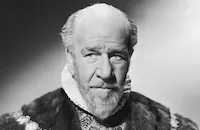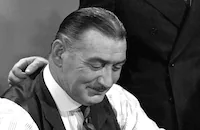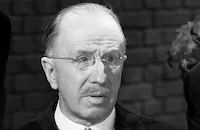When You're in Love

Brief Synopsis
Cast & Crew
Robert Riskin
Grace Moore
Cary Grant
Aline Macmahon
Henry Stephenson
Thomas Mitchell
Film Details
Technical Specs

Synopsis
Austrian singer Louise Fuller, having overstayed her visa in the United States, goes to Mexico. Louise is concerned that she may never have the opportunity to perform with her elderly uncle, Walter Mitchell, who resides in the United States. A friend, Carlos, suggests Louise arrange a marriage with an American in order to gain citizenship, and then get a divorce. Louise meets Jimmy Hudson, an American artist who is staying in the same hotel. Jimmy falls in love with Louise after he hears her sing, but then he is arrested for having no money. Carlos suggests Louise marry Jimmy, and they walk through a short wedding ceremony and leave separately. Louise goes to New York to perform at the Symphony Hall. One day when Louise goes to her apartment, she finds Jimmy waiting to see her. Jimmy is not sure they should go through with their divorce and Louise makes him leave. The couple meets again, however, while Louise takes a break at the seashore. After a drive in the country, Louise and Jimmy are caught in a rain storm and drive to the home of Jimmy's adopted parents, the Hamiltons. Late that evening, after they have kissed, Louise and Jimmy plan a trip to the White Mountains. In order to make the trip, Jimmy rejects an offer to design a mural, and Hank Miller, Louise's publicist, reminds her of her scheduled performance with Uncle Walter. When the press swarms the Hamilton residence to report on the secret nuptials, Jimmy leaves angrily. On the day of the festival, Louise tells Hank that she plans to divorce Jimmy. Jimmy reads Louise's statement in the newspaper, and during the first act of her performance, he arrives backstage. Jimmy presents Louise with the legal papers for divorce and leaves. Louise is too upset to continue her performance, and rumors circulate through the audience that she is injured. Jimmy hurries back to the theater and he and Louise make up. Louise offers to leave the show without returning onstage, but Jimmy insists that she sing "Our Song" to the audience.

Cast

Grace Moore

Cary Grant

Aline Macmahon

Henry Stephenson

Thomas Mitchell
Catherine Doucet
Luis Alberni
Gerald Oliver Smith
Emma Dunn
George Pearce

Frank Puglia

Edgar Kennedy
Barnett Parker
Marcelle Corday
Enrique De Rosas
William Pawley
Don Rowan

Billy Gilbert
Romaine Callender
Dewey Robinson
Pat West
Harry Holman

Edward Keane
Bruce Sidney
Gene Morgan
Robert Linden
Jose Fernandez

Dave O'brien
Carmen Samaniego
Nena Sandoval
Robert E. O'connor
George Cooper
Emery D'arcy
Herbert Ashley
Hector V. Sarno
Antonio Vidal

Soledad Jimenez
Lucille Ward
Fletcher Norton

Scotty Beckett
Robert Mckenzie
Henry Roquemore
Manuel Paris
Arthur Stuart Hull
Jean De Briac

Ann Doran
J. P. Lockney
Frank Leyva
Raoul Lechuga
Dick Botiller
Joe Dominguez
Wilson Millar
Joe Forte
Gus Reed
Nadine Dore
Mildred Claire

Arthur Hoyt
Peggy Stratford
Ruth Hilliard
May Wallace
Otto Fries
Isabelle Lamal
Georgie Cooper
Helen Dickson
Harvey Leach

Bess Flowers
Catherine Wallace
Leyland Hodgson
Paul Power
Carlos Montalbán
Cyril Ring
Clive Morgan
Crew
Jules Barbier
Arthur S. Black
Cab Calloway
Michel Carré
Harry Cohn
Lodge Cunningham
Lodge Cunningham
Dorothy Fields
Clarence Gaskill
Stephen Goosson
Charles Gounod
Annie F. Harrison
Ethel Hill
Jerome Kern
Ernest Lecuona
Leon Leonidoff
Gene Milford
Irving Mills
Dolly Morse
Alfred Newman
Bernard Newman
Meta Orred
Everett Riskin
Robert Riskin
Robert Riskin
Franz Schubert
Al Siegel
Joseph Walker
Western Costume Company
Cedric Worth

Videos
Movie Clip




Film Details
Technical Specs

Articles
When You're in Love
Originally titled Interlude , When You're in Love was a light romance about an Australian singer, Louise Fuller (Moore), who can't return to the US from Mexico because of a visa issue, and an artist, Jimmy Hudson (Grant), who can't pay his hotel bill. In order to solve both of their problems, Jimmy agrees to marry Louise so that she can return to the States, and he gets $2,000 to wipe out his debt. What they didn't figure on was falling in love. Also in the cast were Aline MacMahon, Thomas Mitchell, Henry Stephenson and silent film legend Louise Brooks as a specialty dancer. Brooks reportedly fought with Columbia head Harry Cohn and was booted off the film, although she can be seen without credit in a dance sequence.
When You're in Love was writer Robert Riskin's first effort as a director, working from a script he wrote based on an idea by Ethel Hill and Cedric Worth, and produced by his brother, Everett. The film took advantage of Grace Moore's ability to sing more than just opera featuring songs by Jerome Kern and Dorothy Fields like "Our Song" and "The Whistling Boy" as well as a rendition of Cab Calloway's "Minnie the Moocher." To please opera fans, Moore was allowed to show off those talents with "Un Bel Di (One Fine Day)" from Madame Butterfly, "Love and Music" from La Boheme, both by Puccini, and "The Walz Song" from Gounod's Romeo and Juliet among others.
The film premiered in New York City at Radio City Music Hall on February 18, 1937, and went into general release on February 27th. Frank Nugent of The New York Times echoed the general opinion of critics that while Moore's singing was the highlight of the film, the story was only so-so. "[W]e had hoped that Robert Riskin's first effort as writer and director would have been a trifle more mettlesome than it is. But promotions make conservatives of us all and Mr. Riskin probably felt it was wiser to play safe in preparing and bringing a new Grace Moore picture to the screen. When You're in Love, [...] is little more than a glib reworking of an ancient operatic formula. It is agreeable, tuneful and slight and there is no reason why it should not prove as entertaining today as it did five, ten or twenty years ago. [...] As a postscript we might add that the picture could have stood a few more comic touches, that it takes a long time getting started and that Mr. Grant, Aline MacMahon, Thomas Mitchell, Emma Dunn and George Pearce are quite all right in the assisting rôles."
Decades later, Riskin's frequent collaborator, director Frank Capra, would write in his autobiography that Riskin felt that Capra had received too much credit and himself too little on the films they made together. Capra advised Riskin to "make your own films and you'll get all the credit." He made his own film, and found there was a fine-print proviso to the 'all the credit' clause: 'all the blame' if the film did not come up to snuff. [...] Riskin had directed When You're in Love [...] To everyone's surprise, Riskin's film was disappointing - especially to him. And for some strange reason our intimate relationship was never quite the same again."
Cary Grant's career was not hurt by the lukewarm reception of When You're in Love ; he would become one of the most popular leading men and gifted comedic actors of his generation. For Grace Moore, however, Hollywood stardom remained elusive, and she only made two more films, preferring to concentrate on singing before her death in a 1947 plane crash in Copenhagen at the age of 48.
SOURCES: Capra, Frank The Name Above the Title: An Autobiography
Greenspan, Charlotte Pick Yourself Up: Dorothy Fields and the American Musical
The Internet Movie Database
Nugent, Frank S. "THE SCREEN; ' When You're in Love' Opens at the Music Hall" The New York Times 19 Feb 37
Reid, John Howard More Movie Musicals
Wansell, Geoffrey Cary Grant: Dark Angel
By Lorraine LoBianco

When You're in Love
Quotes
Trivia
Notes
The working title for this film was Interlude. According to Hollywood Reporter production charts, Harry Lachman directed along with Robert Riskin, who receives solo credit on the film. The New York Times review and CBCS list the character played by Luis Alberni as "Luis Perugini" and "Louis Perugini" respectively, instead of "Serge Vilnikoff," his character name on the viewed print. New York Times also noted that the lyrics of Cab Calloway's "Minnie the Moocher" had been censored, and although Daily Variety noted that preview audiences enjoyed Grace Moore's swing rendition of the song, it was not included in the print viewed. As the Daily Variety preview running time was listed as 110 minutes, and the release time listed elsewhere is 104 minutes, it is possible that the song was cut before the film's general release. According to contemporary sources, the services of Leon Leonidoff were obtained courtesy of Radio City Music Hall.














